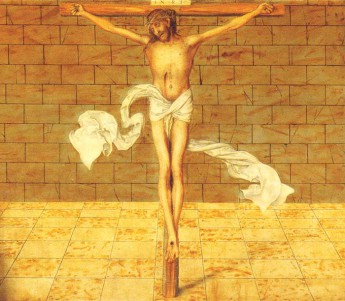Sermon for the First Sunday after Christmas based on Luke 2:22-40
Dear believers with hope: grace, mercy, and peace to you from God the Father and our Lord and Saviour Jesus Christ. Amen.
Simeon lived in dark days. The land of Israel was occupied by Roman armies. The ruler at the time, Herod the Great, was a tyrant. He is the same Herod that ordered the Massacre of the Innocents in Bethlehem. The church had become corrupted by greed and power-hungry leaders. Teaching had wandered from Scripture as the Pharisees threw away the Ten Commandments and made up their own laws for people to follow. God had not sent a prophet for four hundred years, and from all appearances, God had abandoned His people because they had turned away from Him.
Appearances can be deceiving, because God had not abandoned His people. There was a period of silence, but then an angel had appeared to Zechariah in the temple, and Zechariah had prophesied in the temple about his son John, and about the visitation of God to redeem His people. Angels appeared to shepherds, announcing the birth of the Saviour, and Simeon had been told that he would not die before he had seen the Lord’s Christ.
In the midst of darkness, there was light. There was hope. God is faithful to His people even when they are faithless. Christ is born! Let heaven and earth rejoice!
Simeon rejoiced. The world and the church were in a terrible state, but Simeon rejoiced because the Saviour was born. Simeon prophesied of the fall of many, the opposition to the Christ, and a sword piercing the soul of Mary, yet he rejoiced because Jesus was born to save us from falling, save us from opposition, and save us from sorrow and sin.
Appearances can be deceiving, because all Simeon saw was an infant in His poor mother’s arms. But he believed God’s promise that this infant is the Saviour of the world. He believed and says that he is now ready to die in peace.
Anna also lived in those dark days. In addition to the sadness of the state of the world and the church, she had sadness in her own life, too. She was only married to her husband for seven years when he died. At eighty-four, she had lived many years as a widow. She too gives thanks to God upon seeing the infant Jesus at the temple. In her excitement, she tells others at the temple who this baby is, this long-awaited Saviour. She does not say it, but she too was ready to die in peace, as Simeon’s song says.
There is a reason we sing Simeon’s words right after receiving the body and blood of Christ in the Sacrament of the Altar. We too can depart in peace since God has fulfilled His Word. Our eyes see the salvation of God that He has prepared before the face of all people.
Appearances here too can be deceiving, as all we see is bread and wine. But believing God’s Word and His promise that with the bread and wine we receive the true body and blood of Jesus for the forgiveness of sins, we too can be ready to die in peace.
We live in dark days. The world and the church are in a terrible state.
In the midst of darkness, however, there is light. There is hope. God is faithful to His people even when they are faithless. Christ was born to die and save us from our sin. He gives us forgiveness with His body and blood so we are ready to die; we are ready to leave this vale of tears to the eternal joys of Paradise because Christ has opened the kingdom of heaven for us.
Simeon’s prophecy is part joyful, part sorrowful. There is joy because God has fulfilled His promise to send a Saviour as foretold by the prophets for thousands of years. Christ did not come just for the people of Israel, but He is a light for revelation to the Gentiles. He came for the whole world, to save us all. Christ came to reconcile man with God, and also to reconcile man with man. All war and division will cease.
There is also sorrow. Simeon says to Mary, “Behold, this child is appointed for the fall and rising of many in Israel, and for a sign that is opposed (and a sword will pierce through your own soul also), so that thoughts from many hearts may be revealed.” Here is revealed that what is good for us is terrible for this infant. He will be opposed and spoken against. He will cause division. He will suffer and die, which will also bring suffering to His mother and His followers.
But the sorrow and horror of Christ’s suffering and death is also His glorification. In His self-sacrifice He shows us the love of God for us, fallen mankind. Jesus’ death is how we know God’s love for us. We don’t have to wonder if God has abandoned us because of our sin. We don’t have to fear even in dark times. The world and the church may be in dark times, but God is faithful to His people even when they are faithless. He does not abandon us because of our sin. Instead, He forgives our sin.
He forgives our sin, so we are ready to depart in peace. Then, we are bold and eager for the end, as Simeon was. Christ’s sorrow has brought us joy, both now and in eternity, so we pray with Simeon, “Lord, now you are letting your servant depart in peace.” Amen.
The peace of God which surpasses all understanding will keep your hearts and minds in Christ Jesus our Lord. Amen.
